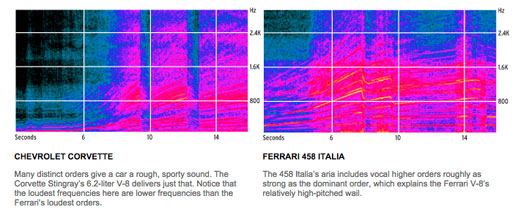
En Car and Driver han publicado un interesante artículo sobre por qué no todos los motores de coche suenan igual y sobre qué hace que suenen como suenan:
These sound-generating vibrations derive from the combustion in each cylinder and the corresponding pressure waves in the intake and exhaust systems. They are all keyed to the engine’s rotational speed; as revs rise and fall, the pitch goes up and down.
Calculating that dominant frequency at any given rpm is straightforward. First, you convert engine rpm to Hertz, the frequency unit, with the following formula: 60 rpm = 1 revolution per second, or 1 Hz. Thus, a V-6 spinning at 1800 rpm can be said to be running at 30 Hz (1800/60 = 30).





Leave a Reply
Lo siento, debes estar conectado para publicar un comentario.